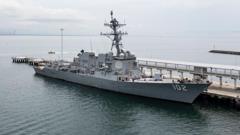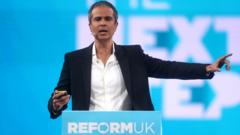What Does Trump Aim to Achieve with US Bombing of Venezuela Drug Boats and Warship Deployments?

Published: 2025-09-04 12:56:02 | Category: wales
In recent weeks, the United States has escalated military operations in the Caribbean, primarily targeting drug trafficking linked to Venezuela. This has included a significant naval build-up and a controversial airstrike that reportedly killed members of a Venezuelan gang. Analysts suggest that these actions represent a dual strategy: disrupting drug flows and exerting pressure on the Venezuelan regime. However, the broader implications of these military moves remain uncertain, raising concerns about potential escalation in the region.
Last updated: 26 October 2023 (BST)
Key Takeaways
- The US has increased military presence in the Caribbean to combat drug trafficking.
- President Trump announced a military strike on a Venezuelan vessel, claiming it was linked to narcoterrorism.
- Experts warn of the risk of escalation and uncertainty regarding the US's long-term strategy.
- The naval build-up is the largest in the region since 1965, indicating heightened tensions.
- Venezuela's response includes a mobilisation of its militia, although its effectiveness is questionable.
Background to the Current Situation
Since Donald Trump took office in January 2021, the administration has intensified its focus on anti-drug trafficking efforts in Latin America, particularly concerning Venezuela. The recent deployment of US warships to the Caribbean and the bombing of a vessel allegedly carrying drugs have raised alarms about the potential for military conflict in the region.
The Recent Military Actions
On Tuesday, President Trump released footage of a military strike against a small boat in the Caribbean, claiming it was transporting drugs from Venezuela. The strike reportedly resulted in the deaths of 11 individuals associated with the Tren de Aragua gang, a group the US has linked to drug trafficking operations. Trump described Venezuela as a source of "the worst criminals" infiltrating the US, further escalating rhetoric against the Maduro regime.
Details of the Airstrike
The airstrike was presented as part of a broader initiative to combat drug trafficking, a key objective of Trump’s administration. Following the attack, Defence Secretary Pete Hegseth stated that military operations in the region would continue, suggesting that this was not an isolated incident but rather part of an ongoing strategy.
The Scale of US Military Presence
The US military has deployed a substantial naval force, including guided missile destroyers, the Iwo Jima amphibious group, and a nuclear-powered submarine, totalling around 4,500 troops. According to Professor Alan McPherson, this military build-up is unprecedented since the mid-1960s and reflects a serious commitment to exert pressure on the Venezuelan government.
Strategic Implications
Analysts have noted that the scale of this military presence is reminiscent of historical 'gunboat diplomacy'. While the stated aim is to combat drug trafficking, some experts believe this could also serve as a warning to the Maduro regime or even encourage an internal uprising within the Venezuelan military.
Venezuela's Response
In response to the US military activities, Venezuelan President Nicolás Maduro has dismissed claims of his government’s involvement in drug trafficking, describing the accusations as a pretext for intervention. He has threatened to mobilise 4.5 million militia members to defend against what he perceives as US aggression. However, analysts suggest that this number is exaggerated and that the militia lacks the training and capability to act effectively in a military confrontation.
Potential for Escalation
Experts like Rebecca Bill Chavez have expressed concerns about the risk of escalation following the airstrike, emphasising that this military action is unlike typical counter-narcotics operations that usually involve cooperation with regional partners. The uncertainty surrounding the US's intentions and the potential for miscalculation raises the stakes in an already volatile situation.
The Complexity of US-Venezuela Relations
Despite the tough stance on drug trafficking, the Trump administration has engaged in limited cooperation with the Maduro government, including a prisoner exchange agreement and the resumption of operations by US oil company Chevron in Venezuela. These actions have created a mixed signal regarding the US's overall strategy in the region.
Mixed Signals from the Trump Administration
Critics have pointed out that the simultaneous military build-up and diplomatic engagements have left many observers confused about the US's true objectives. The administration's dual approach of military pressure combined with diplomatic overtures suggests an attempt to balance hard power with efforts to foster change within Venezuela.
Looking Ahead: What’s Next for US Policy?
As the situation develops, it remains unclear how the US will proceed in its military and diplomatic efforts in the Caribbean and Venezuela. Some analysts suggest that while military action may be necessary to counter drug trafficking, an outright invasion could lead to significant backlash both domestically and internationally.
The Risk of Military Intervention
Any military intervention in Venezuela could meet with fierce resistance, complicating Trump’s stated non-interventionist stance. Secretary of State Marco Rubio has suggested that such measures may be necessary to combat drug trafficking effectively, but the implications of further military action could lead to prolonged conflict and instability in the region.
Conclusion
The recent military actions by the US in the Caribbean reflect a significant shift in strategy towards Venezuela, focusing on drug trafficking but also embodying broader geopolitical tensions. The potential for escalation remains high, and the effectiveness of these strategies is yet to be assessed. As the US balances military pressure with diplomatic negotiations, the future implications for both Venezuela and US foreign policy are far from clear. How these developments unfold will be crucial to understanding the trajectory of US-Latin American relations in the coming months.
What do you think the US's next move should be in addressing the situation in Venezuela? #Venezuela #USMilitary #DrugTrafficking
FAQs
What prompted the US military actions in the Caribbean?
The US military actions were prompted by a desire to combat drug trafficking linked to Venezuela, which has been a key focus of the Trump administration’s second term.
What was the outcome of the recent airstrike?
The recent airstrike reportedly killed 11 members of the Tren de Aragua gang, who were accused of trafficking drugs from Venezuela to the US.
How has Venezuela responded to the US military presence?
Venezuela's President Maduro has rejected US claims of drug trafficking involvement and threatened to mobilise militia forces in response to US military actions.
What are the risks of escalation in the region?
Analysts warn that the heightened military presence and operations could lead to unintended conflicts or miscalculations, raising tensions between the US and Venezuela.
How does the US typically handle drug trafficking at sea?
Traditionally, US maritime anti-drug operations are led by the Coast Guard in collaboration with regional partners, rather than through military strikes.



